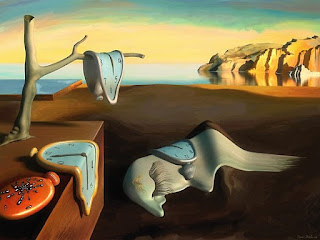In an infinite universe...would there be infinite 'me'?
This question might seem ridiculous at first, but it follows a process of thought. The other day I was talking to a professor and he believed that if the universe is infinite, not only will there be another 'him', there will be infinite copies of him.
The reasoning: "the probability of another 'me' existing in the universe is not zero, even if it is seemingly very low. So as the number of trials tend infinity, the probability of at least a single copy of 'me' existing again increases and increases. Eventually, we reach a number of trials/'spaces' that the probability of at least one other of me existing is so high...there will have to be another copy of me certainly.
Put another way, matter can arrange itself in different ways (quantum states). But the number of different arrangements is not infinite. So after a certain amount of space, the combinations will start to repeat over again. I (as a person) and my entire life (as a sequence of events) is just one of those combinations, so in an infinite universe, my life will exist somewhere else in the universe."
Sounds logical? Not completely.
1) Probability Laws
2) Quantum Mechanics and misconceptions
3) The irony of 'scientific randomness'
The reasoning: "the probability of another 'me' existing in the universe is not zero, even if it is seemingly very low. So as the number of trials tend infinity, the probability of at least a single copy of 'me' existing again increases and increases. Eventually, we reach a number of trials/'spaces' that the probability of at least one other of me existing is so high...there will have to be another copy of me certainly.
Put another way, matter can arrange itself in different ways (quantum states). But the number of different arrangements is not infinite. So after a certain amount of space, the combinations will start to repeat over again. I (as a person) and my entire life (as a sequence of events) is just one of those combinations, so in an infinite universe, my life will exist somewhere else in the universe."
Sounds logical? Not completely.
1) Probability Laws
This argument branches off the idea that the universe "works" according to probabilistic laws, according to which everything is possible, and it all depends on the probability of something happening. According to him, the laws of the universe do not establish what things happen and which do not, but only what probability of happening each event has. Although I disagree on that approach, I imagine I agree to derive an argument.
Even assuming this approach is right (ie-that the universe is governed by probabilistic laws where everything is possible) the argument it leads to a contradiction. Let's follow his reasoning:
1) According to the laws of the universe, finding another "you" has a probability greater than zero (even if it is very small), then, if space and time are infinite, that event (that you find another "you") will occur
2) According to the laws of the universe, the probability of NOT finding another "you" is more than zero probability, then, if space and time are infinite, that event (that you do NOT find another "you") will occur.
So in an infinite universe, there will be another me and also NOT be another me. Contradiction.
To fix this contradiction, you could try to argue that the probability that you will NOT find another "you" in an infinite universe=0, so the contradiction would never happen, but then you would need to explain why.
However, this explanation cannot be a probabilistic one like the arguments above, because a probabilistic argument can be given for anything we want. Everything has a chance of occurring (as we said before, even if very low), but we need to prove the probability of NOT finding another "you" is zero. Not a probability...just zero. This can't be done.
Another flaw: the probability that someone other than you exists in a place is greater than zero, therefore, if there are infinite places, the probability that someone other than you exists there is 1. Who is to say you have to exist AT ALL? In each trial, someone else could exist instead of you. So...why do you exist AT ALL, let alone 2 or more copies of you?
2) Quantum Mechanics and misconceptions
That physicist claims that the existence of "another you" is a consequence of the laws of quantum physics, as there are limited numbers of combinations. That's not true. The laws of quantum physics, do not affirm what will happen or not; they are deduced from the observation of the universe. And what they establish is likelihood of events. Those probabilities are exactly that- probabilities: they don't tell us what is going to happen or not, but what the statistical frequencies of the phenomena are.
That an outcome of an experiment has probability x% does not mean that it will happen x% of the time.
Nor does it mean that if we repeat the experiment infinitely, we will obtain that result x% of the infinite times (which is...infinite times?), it simply means the frequency with which a result is obtained is approaching x% as we repeat the experiment.
In short, that step from probability to an infinite universe is incorrect. The probability cannot be applied to infinite repetitions of an experiment.
From the mathematical point of view it is very clear: the probability is a limit (when the number of repetitions tends to infinity); when I say that the limit when X tends to infinity of, for example, X/(X+1) is equal to 1, what I say is that when x is very large, the result of that operation is close to 1. But I CANNOT say it will ever be 1. In fact, I can show that it will never be 1, because the numerator is always less than the denominator (one unit less).
Physics equations are also mathematical equations. Applying them directly to an infinite universe, and saying that everything that these laws admits as possible will occur is absurd, similar to saying that X/(X+1) will =1 at some point.
Conclusion: A phenomenon (ie-"another me' exists) may occur, but the explanation is not simply: "because its probability is not zero and the universe is infinite."
3) The irony of 'scientific randomness'
Many things also have to be clarified about chance. Explanations based only on chance always end in contradictions, because chance is precisely the absence of an explanation.
If you try to explain reality starting from the principle that everything is by chance (without explanation), you are already contradicting yourself. Quantum Physics talks about the uncertainty we have about the state of the universe.
It starts from the hypothesis that there is a randomness in physical reality. But that randomness is a starting point for Quantum Physics, not a conclusion. That is, physicists assume that there is a fundamental, undesigned randomness in matter, and THEN study the "regularities" or "patterns" that are observed. Of course, the way of studying these regularities is different from the one used by classical Physics. In quantum physics these patterns are studied statistically.
So quantum physics starts from the (not scientific, but philosophical) principle that everything is random in matter, and tries to find explanations for the frequencies with which we observe consistent phenomena. But for this, ironically, we are accepting that these probabilities/frequencies are fundamental...so there is something fundamental. The Schrodinger wave equation, for example, is an equation whose variables are probabilities, but the equation itself has the form it has, and not another. The existence of the probabilities it includes ARE NOT random. All quantum physicists take it for true, and they don't think that the form of the equation is random, so even if the universe was infinite, the equation would still hold anywhere.
This shows that QM is based on the initial hypothesis that matter arrangements are random, but then explanations are derived for consistent phenomena...which are not random.
If the universe were simply governed by 'chance', then it would be impossible to study it and understand; if we can study the universe, and discover laws that govern it, it is because there is a certain order in the universe. The scenario where a physicist says that the universe is pure chance is funny, because then that person should change career path: their work is useless: they are trying to explain something that, according to themselves, has no explanation and is just pure chance. The success of quantum physics is precisely the amazing regularity with which its predictions are fulfilled. These laws of quantum physics are always fulfilled (not randomly).
4) The uniqueness of a person
Also, demonstrating that something is random is impossible. In mathematics a sequence of symbols is called random when it cannot be explained by a sequence smaller than it. There is a mathematician, Chaitin, who showed that it is impossible to prove that a sequence of numbers is random. Randomness is unprovable. Scientists can use it as a working hypothesis, like in QM, but not prove it "scientifically."
4) The uniqueness of a person
Finally, on whether or not we are unique ... let's see, I think it is enough to see reality with common sense: we clearly perceive our uniqueness every day. A "scientific" theory (in reality, it cannot be scientific, but philosophical) that says that I am not unique is denying evidence. Scientific theories are constructed from what we observe. If in the end they lead us to contradict what we observe, what needs to be done is to review the theory, because surely we have made some wrong reasoning. People may despise this argument, saying that I do not perceive my uniqueness, but that is not true. The mere fact that there are the words "I" and "you" shows that we perceive ourselves as something unique, different from the reality that surrounds us. I might discuss this in another article.
So now you can sleep at night knowing chances are, there isn't another you observing you from afar. You're welcome.


A very well-thought essay. The contradiction shown here isn't obvious but is definitely true
ReplyDelete